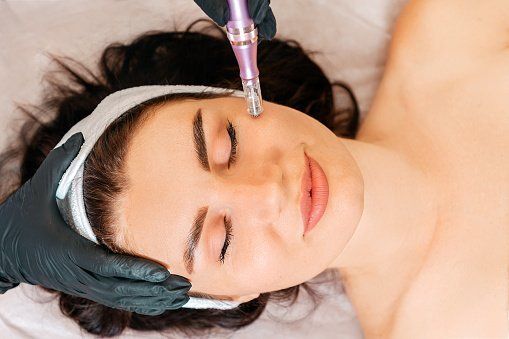What is Genioplasty & Its Types, Procedure, and Recovery?
- By Design Team
- •
- 13 Oct, 2021
- •
Genioplasty / Chin Implants

If you’re looking to change your appearance, there’s a good chance you’ve heard of Genioplasty. Many people get this surgery to change the shape of their face, but what is it?
Genioplasty is a surgery that alters the chin. It can be used to aid breathing in the upper airway or for cosmetic reasons. Because the procedure involves operating on bones, it takes around 6 to 8 weeks to heal, and people are urged to eat a soft diet for some time.
You probably still have a lot of questions about Genioplasty. Don’t worry; we’ll delve into it below so you learn everything you need to know about its types, procedure, and recovery.
Types of Genioplasty
It’s essential to know the different types of Genioplasty before proceeding with any sort of surgery. Here are the two types:
- Sliding Genioplasty : A surgeon will use a saw to cut away parts of the jaw. This allows them to move it into place and then create a different look. This uses the patient’s own bone to complete the procedure.
- Chin Implant : A chin implant is a form of Genioplasty, but instead of using the patient’s bone, an implant is placed to create the look required.
It really depends on the patient’s needs whether the surgeon would recommend Sliding Genioplasty or a chin surgery. If the patient requires a fuller look in the jaw, in all likelihood, it will be a chin implant. The surgeon will only be able to go the Sliding Genioplasty route if the patient is removing parts of the bone to create a less prominent chin.
What Can You Expect After Surgery?
Getting Genioplasty surgery is not a simple procedure, and that is reflected in the healing time, which can take 6 to 8 weeks. Following whatever your surgeon tells you will result in the best results. Here are some more things you need to know about the recovery.
- There will be swelling and bruising: The surgery is invasive on the face, which means swelling and bruising will occur. It is perfectly normal when it comes to such a hefty procedure. Cold compresses are great for swelling. Plenty of water will help with the healing.
- You can return to work after two weeks: You will still need to take a lot of care to ensure there is no trauma to the face. You can gradually return to regular activity from the third week.
- You should avoid any type of sports until fully healed: Bone is soft when it has been operated on, meaning that any sort of injury could ruin the procedure and harm your look.
- Toothbrushing is off-limits for a few days: Do not attempt to use a toothbrush. A glycerin swab will help keep things clean throughout that time.
- Do not attempt to move your chin: The recovery calls for your chin to have little impact, which means you always need to consider whether any activity will make it move.
- Expect post-operative pain: This can be managed with prescribed medication. Only take other painkillers if the surgeon authorizes it.
- You can shower after one day: You need to wash your face gently, and rubbing too hard could move the chin out of place. Always exercise caution.
If you follow the above steps, the road to recovery should be relatively simple, but there’s still more you need to know about the aftermath of the surgery.
Can You Eat After Surgery?
It is essential to be aware that you should not consume food for the first two days after surgery. Any sort of movement will result in a lot of pain and could mean that the chin will not heal in the way the surgery calls for it to.
Drinking water is an excellent way to promote healing, but liquid supplements are also an excellent way to get nutrients in those days to make sure you’re nourished during that time.
You can reintroduce food on the third day, but only a soft diet for five days. This will allow your face to continue healing during that time. You can reintroduce your usual diet after a week but go at your own pace. Don’t force yourself to eat hard foods.
Soup is a great food to eat because of the number of nutrients in it but it always goes smooth. You don’t want to be chewing chunky soup. That will not be good for the recovery in those initial days post-surgery.
Speak to a Medical Professional if You’re Considering Genioplasty. Now all you have to do is consider whether the Genioplasty is right for you. Oral & Maxillofacial Surgery West Hollywood is one of the places that offers the surgery, so you should speak to a professional about it.

Many people can live their full life without having any complications with their wisdom teeth. Unfortunately, mouths can only hold twenty-eight teeth so when wisdom teeth start to come in they create issues. That being said many people worry about the pain that comes with a tooth extraction.
When a wisdom tooth is extracted, there is a lot of pressure and tugging as the dentist removes the tooth. You should not feel any pain during the procedure. After the surgery, while you are recovering you may have minor discomfort but will most likely have a prescription to help with the pain.
Many people every single day have their wisdom teeth removed all over the world. It is an outpatient procedure meaning you will go in for the surgery and be home in the comfort of your bed at night. Even knowing this it can still be worrisome for many people. Read on to find out exactly what to expect during a tooth extraction to ease your mind.
Is It Painful to Have Your Wisdom Teeth Extracted?
When your wisdom teeth are extracted, you will feel pressure and might feel a little uncomfortable. During the procedure, you will have an anesthetic and should not feel any pain, if you do let the dentist know right away. They want you to be comfortable and calm.
You do not need to try and handle any pain while you are there. There are a couple of types of anesthesia that may be offered in some cases such as:
·For those that may not be able to handle being awake, you can sometimes be put lightly under. You will be less aware of what’s going on around you.
·Local anesthetic or nitrous which means you will be awake but will feel absolutely nothing. You may feel the pressure of them being in your mouth or tugging.
- The recovery from an oral and maxillofacial surgery or tooth extraction surgery takes time and can be quite painful. You will be given plenty of meds to keep you comfortable when you get home, but many people still feel quite a bit of pain. You may feel several symptoms that are all normal such as:
·Pain lasting for days
·Pain that increases hours after the surgery
·Swollen cheeks
·Swollen jaw
These are all unfortunately normal and can be managed with prescription and over-the-counter medicines are given to you by your doctor. Even if the pain is bad, it is important to take the medication as prescribed. If the pain gets to be too much you can always call back in to see if there is something that could be done for you.
When Can You Resume Normal Activity After an Extraction?
You will want to take a sick day or two from work or school following a tooth extraction. You will be feeling fairly miserable and want to rest as much as possible. It will also be uncomfortable to eat and you will need to stick to soft foods for the first few days. You do not want to have something poke or jam into the area where your tooth was removed.
Depending on the type of sedation you had you may need a longer recovery at the doctor’s office. When you are put under you will not be able to drive or function well for hours. It takes time to get out of your system. You will feel groggy.
Once your pain is under control and you feel comfortable you can get back to your daily life. Take it easy and rest the first few days and you will be back to normal much faster compared to pushing yourself on day one.
How to Know When You Need Your Wisdom Teeth Removed?
When your wisdom teeth come in you could have pressure, swollen gums, and overall discomfort. On the rare occasion that your wisdom teeth come in aligns correctly with healthy gums you will not need an extraction. This however is not a common occurrence.
Other than a little discomfort your wisdom tooth can also create much bigger problems as they come in such as:
·Bad breath
·Bleeding gums
·Headaches
·Illness
·Infections
·Pressing against the bone
·Stiffness
·Swelling
Many people put off the procedure due to the dear surrounding it. Rest assured the West Hollywood office Sunset Oral will put your mind at ease and give you a healthier mouth. You will be able to eat without pain and be less likely to have a bad infection in your gums one day.
Wisdom Teeth Removal Is Less Painful Than You May Know
While you will not feel pain during your procedure you will feel pain afterward. Do not let that stop you from having the worrisome tooth removed. As long as you follow the advice your dentist gives you your recovery pain should be minimal with rest and pain management.





